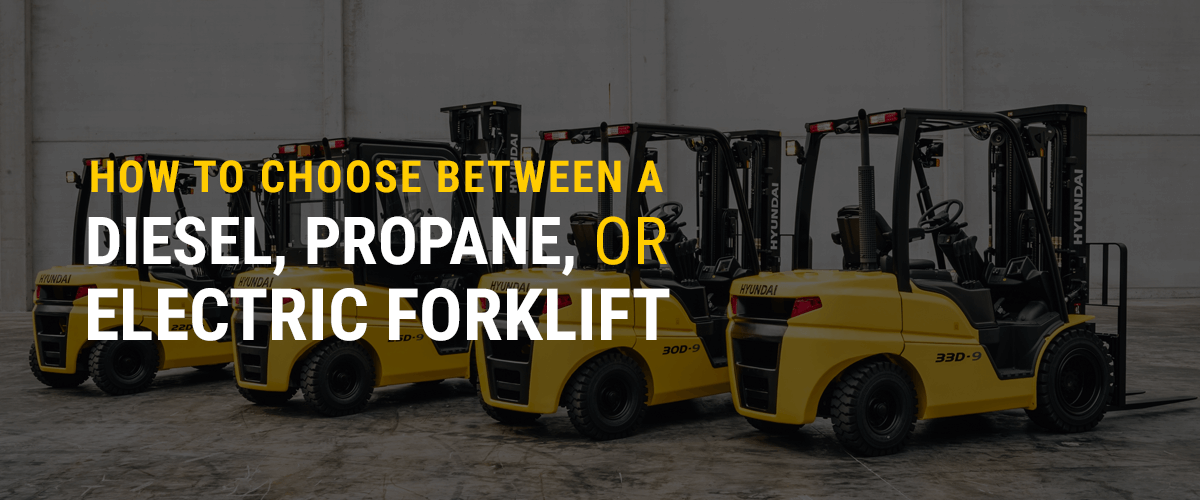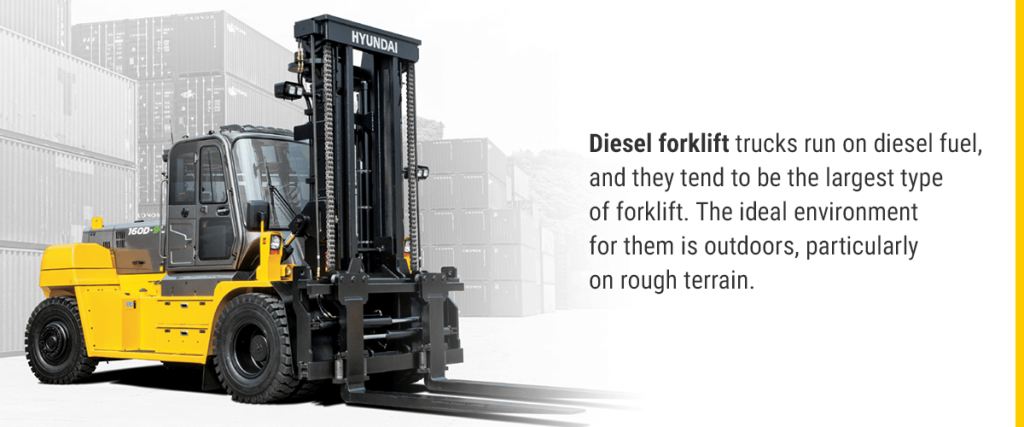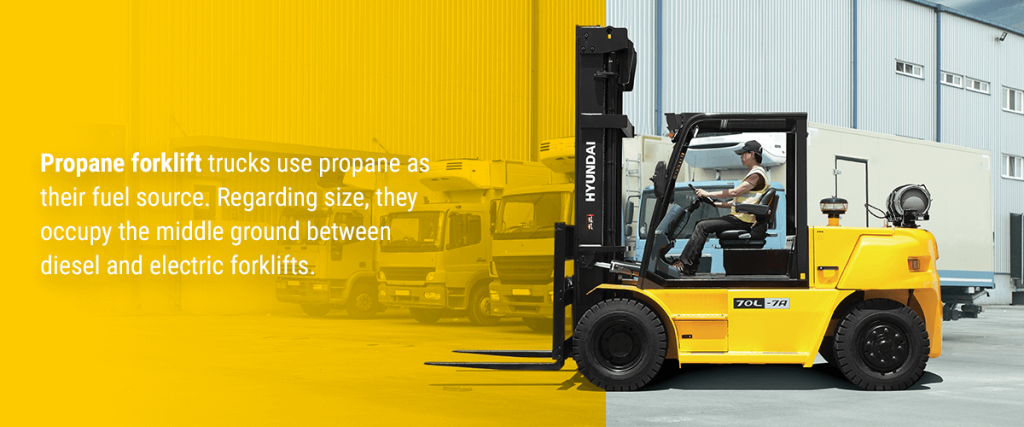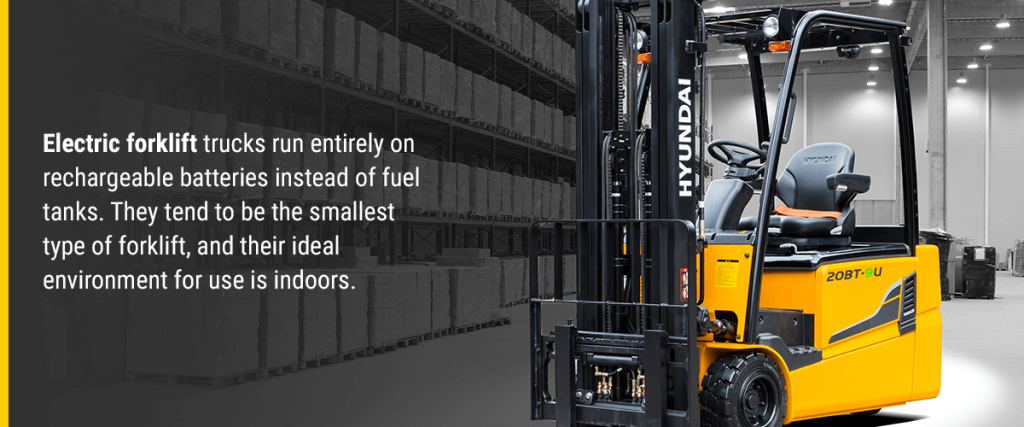
How to Choose Between a Diesel, Propane, or Electric Forklift
Choosing Your Forklift: Quick Facts on Fuel Types
- Your main choices for forklift fuel are diesel, propane, and electric, each suited for different jobs.
- Diesel forklifts are powerful and best for tough, outdoor tasks but are noisy and less eco-friendly.
- Propane forklifts are a versatile, middle-ground option that works well both indoors and outdoors.
- Electric forklifts are the quiet, zero-emission choice for indoor spaces, but have a higher upfront cost and need time to recharge.
- The right forklift for you depends on your budget, work environment, and the power you need.
Forklifts are valuable tools for any environment where large objects must be routinely moved from place to place. Whether you work in a grocery store, a warehouse, or somewhere else altogether, forklifts are an indispensable element of your job. They enable you to transport things across short distances with much greater speed and efficiency than you could ever do alone.
If you’re looking at getting a forklift, though — whether for the first time or to expand the fleet you already have — you may be unsure which forklift fuel types will best suit your needs. Three main varieties of forklifts exist — diesel, propane, and electric. Each has its advantages and disadvantages, so your choice ultimately comes down to a matter of priorities. These will differ depending on your work environment and personal preferences.
Get Assistance Choosing a Forklift
Below is an outline of the three forklift types, with the pros and cons of each. You can weigh the costs and benefits against your needs to determine which kind of forklift is best for you.
Diesel
Diesel forklift trucks run on diesel fuel, and they tend to be the largest type of forklift. The ideal environment for them is outdoors, particularly on rough terrain. If you’re considering adding a diesel machine to your fleet, check out the main diesel forklift pros and cons below.
Pros
Here are the main pros of diesel forklifts to help you make your decision:
- Sticker price: While not as cheap as propane forklifts, the initial cost of a new diesel forklift truck is usually much less than an electric one. When deciding between a diesel vs. electric forklift, you’re better off selecting the former option if you seek cost-effectiveness.
- Fuel price: Diesel fuel tends to be significantly cheaper than propane, saving you more money over time.
- Torque: Diesel engines can produce much greater torque than propane or electric, enabling them to do more substantial work — lifting heavier loads, going up steeper ramps, and accelerating more rapidly.
- Long lifespan: Diesel forklifts tend to last the longest out of the three types, giving you the most time in return for your investment.
- Easy maintenance: Diesel engines typically require less maintenance than propane or electric ones, due to their longevity and durability.
- Higher residual value: Diesel forklifts are generally worth more at the end of their life than propane or electric models.
Cons
On the other hand, here are the main cons of buying a diesel forklift:
- Sticker price: Though cheaper than electric forklifts, diesel forklift trucks are typically more expensive to buy new than propane ones.
- Maintenance costs: Diesel engines may require less maintenance than their counterparts, but when they do need it, it tends to cost more.
- Environmental impact: Diesel is a fossil fuel, meaning it releases significant amounts of carbon into the atmosphere. While not nearly as bad as many fuels, it’s the least environmentally friendly of the three types used in forklifts.
- Noise: Diesel forklifts are unquestionably the loudest of the three. Fuel combustion occurs at a high volume, which can be inconvenient.
Propane
Propane forklift trucks use propane as their fuel source. Regarding size, they occupy the middle ground between diesel and electric forklifts. The same is true of their ideal environment — they can be comfortably operated both indoors and outdoors. Learning these propane forklift pros and cons can give you more information on this equipment type.
Pros
Does a gas forklift sound like the perfect option for you? Here are some advantages you can get from a propane forklift:
- Sticker price: Propane forklifts are usually less expensive than both diesel and electric forklift trucks when buying new. In the debate of gas forklifts vs. electric, the former wins on sticker price.
- Fuel efficiency: Propane forklifts have the greatest efficiency, as they can run for the longest time on a given amount of fuel. They can usually last for an entire shift on a single tank.
- Refuel time: Propane fuel tanks are easy to switch when depleted, minimizing the amount of time spent on refueling during a shift.
- Torque: Though propane forklift truck torque isn’t as high as diesel, it’s significantly greater than electric.
- Environmental impact: Despite not being as environmentally friendly as electric forklifts, propane trucks release far fewer emissions than diesel ones, making them the more sustainable of the two.
Cons
Where there are pros, there are always some cons. Here are the main disadvantages of propane forklifts:
- Overall cost: Though propane forklift trucks have the lowest sticker price, the cost of ownership over time tends to be higher than that of either diesel or electric.
- Visibility: Due to the space taken up by the fuel tank on the back of the machine, propane forklifts have poor rear visibility, making them harder to navigate.
- Lower residual value: Out of the three forklift types, propane tends to have the least residual value at the end of its life.
- Torque: Propane trucks may have better torque than electric ones, but they still have significantly less than diesel.
- Environmental impact: Though propane is more environmentally friendly than diesel, it’s still a fossil fuel, making it inferior to electric concerning sustainability. It also releases high quantities of carbon monoxide.
Electric
Electric forklift trucks run entirely on rechargeable batteries instead of fuel tanks. They tend to be the smallest type of forklift, and their ideal environment for use is indoors. If you’re stuck between an electric vs. LP gas forklift — or a diesel model — these electric forklift pros and cons can help you decide.
Pros
Check out the main benefits of buying an electric forklift:
- Fuel price: Because electric forklifts don’t use traditional fuel, they don’t have the refueling costs that diesel and propane do.
- Noise: The absence of fuel combustion leads to much lower noise levels, making electric forklift trucks easily the quietest of the three types.
- Maneuverability: Without the need for fuel storage, electric forklifts are smaller and more compact than their counterparts. They are therefore much easier to turn and maneuver, particularly through small, enclosed spaces.
- Environmental impact: Electric forklift trucks don’t burn any fossil fuels, which means they don’t release any carbon emissions. This arrangement makes them very environmentally friendly, more so than diesel or propane. Choosing between an electric vs. propane forklift is easy if you value sustainable machines.
- Maintenance costs: Since electric engines have less complex mechanics than diesel or propane ones, they’re less expensive to maintain and repair.
Cons
In contrast, here are some cons involved in purchasing an electric forklift:
- Sticker price: They may save on fuel costs down the road, but electric forklifts usually have the highest initial price out of the three types.
- Torque: Unfortunately, the cost of sacrificing fuel results in significantly lower torque. Electric forklift trucks can occasionally have a hard time reaching high speeds or making it up ramps.
- Quality decline: Diesel and propane forklifts can run at more or less the same level of efficiency until all their fuel is gone. Electric forklifts, however, decline in speed and power as their battery drains, making them less useful later in the day. Ensure you know how much electricity your forklift uses before making your final choice.
- Refuel time: Electric batteries take a long time to recharge. If an electric forklift depletes its battery two-thirds of the way through a shift, it may be out of commission for the rest of the day.
Get Your Forklift From Thompson Lift Truck Today
Once you’ve evaluated your needs and weighed the benefits, disadvantages, and costs of each forklift type, you’ll know which one fits your workplace. But now the question is, where do you buy it?
Look no further than Thompson Lift Truck. We offer top-quality forklifts in the Southeast and other manufacturers, all while providing outstanding customer service. We also have rental options if you only need a forklift for a short time. Get in touch with us to start the path to acquiring the ideal forklift for your business today!
FAQs About Diesel,Propane or Electrick Forklift
What is better, propane or electric forklift?
Electric forklifts are the best choice for indoor use due to their zero emissions and quiet operation. Propane forklifts are more versatile, offering solid power for both indoor and outdoor jobs. The team at Thompson Lift Truck can help you compare the upfront and long-term costs.
What is the difference between an electric forklift and a diesel forklift?
The main difference is power and environment. Electric forklifts run on a battery, produce zero emissions, and are quiet, making them ideal for indoors. Diesel forklifts run on diesel fuel, are much more powerful, and are built for tough, outdoor tasks, but they are loud and produce emissions.
What is the best power source for a forklift?
Diesel is best for maximum power in outdoor, rugged environments. Electric is best for indoor, emission-sensitive spaces. Propane is the best all-around, versatile choice for mixed indoor and outdoor use. A specialist at Thompson Lift Truck can help you choose the right one for your specific application
Can I use a regular propane tank on a forklift?
No, you cannot. Forklifts require special industrial-grade propane tanks designed for liquid withdrawal. A standard BBQ propane tank is designed for vapor withdrawal and will not work properly. Using the wrong tank is inefficient and unsafe
How long does a forklift last?
Forklift’s lifespan depends on the fuel type and maintenance. With proper care, diesel forklifts tend to last the longest. On average, a well-maintained forklift can last for 10,000 hours or more. Thompson Lift Truck can provide details on the expected lifespan of specific models
Is propane the best power source for forklifts?
Propane is the best choice for versatility. It provides strong, consistent power (unlike an electric battery that can fade) and can be used both indoors and outdoors, which diesel forklifts cannot. It’s a fantastic middle-ground option, though your specific needs for power or zero emissions might make diesel or electric a better fit.




